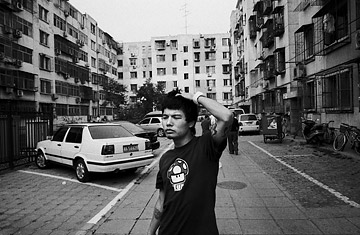
Mao Ce waits for friends outside an apartment block during a trip to Beijing.
Like many young people in Changsha, Mao Ce has great difficulty discussing his future. "I feel that my life is like a wind, blowing quickly and changing direction often," he says. "I have no plan for my future, and I don't want one. I never think about my future." Twenty-four-year-old Mao's comments are not reflective of some melancholic post-teen pouting — his feelings of resentment and despair are commonplace among the young adults of Changsha.
A warren of hastily built cement blocks sliced by grand new boulevards and glass high-rises, Changsha — China's 19th largest metropolis — is immersed in the din of construction and the grey pallet of soot and smoke common to the cities of a booming China. Mao Ce's city is a rough and tumble place, and he and his cohort occupy a unique place in modern Chinese history. Products of China's vigorously enforced one-child policy, twenty-somethings like Mao feel that they've been left to shoulder the mistakes of their government even as they adapt to a society that is transforming at an overwhelming pace. Having missed out on the life guarantees of their parent's generation (job placement and social safety net) they're also alienated from the relative freedom enjoyed by those just a few years younger than they are. "You see my girl here", Mao Ce gestures to his young girlfriend sitting across the table. "She is only a little younger than me, 20-years-old, but already between her and her friends and me and my friends there is a huge difference. They are much more open in their thinking and view of the world."
Mao Ce has never been employed. A high-school dropout, he has almost no chance of landing a good job in the education-obsessed marketplace of modern China. His parents divorced when he was a child, so he lives with his father and grandfather in a sixth floor walk-up in a crumbling, Soviet-style apartment block near the center of this ancient metropolis. Mao's father owns the apartment, a sign of his moderate success in international trade. But as solid as his living situation is, Mao Ce, and others like him, can feel left behind in today's China where freedom of opportunity has created an overwhelming pressure to succeed. "You know, this is the People's Republic of China but we are not a republic." Mao says, "A republic is where somebody doesn't need to pay for food if they are hungry. Where we treat each other like brothers even if we aren't from the same family. Where we respect each other. Right now people are not like that. They just care about themselves, just want to make more money. Most people only think about their own life, their own stuff, their Adidas, their Nikes."
Mao Ce and his friends, along with many of the other young people of Changsha, remain in a state of postponed adulthood. Unemployed and disaffected, they have embraced a kind of blissful ambivalence towards life as they float between parties, drugs, and a sexual freedom unknown to their elders. Some run small businesses — DIY music venues, tattoo parlors, head shops. Mao Ce himself occasionally gigs as a DJ, but in a city as localized and provincial as Changsha, he has few prospects for making a career of it. "I have no wishes or dreams", he says. "When I was young I had dreams but not anymore. Maybe now I am more honest."
